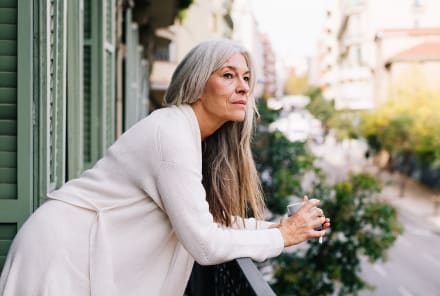Advertisement
How Racism-Related Vigilance Affects Health In BIPOC Communities


As the country struggles to find its footing in this "new normal," an unusual phrase has made its way into the conversations about health disparities: racism-related vigilance. What does it mean? Simply stated, racism-related vigilance is the adverse stress response that comes from living with the constant expectation of experiencing racial discrimination in your daily life.
It is waking up every morning with the knowledge that as soon as you leave the sanctuary of your home, your life becomes predictably unpredictable. You anticipate being judged by the color of your skin—seen as less intelligent, less capable, more criminal, and, yes, less human.
You are not sure if this bias will be overt, subtle, or even life-threatening as recent events have highlighted. The apprehension of not knowing when, where, and how keeps the stress response on continual high alert all day. Some studies have even shown that this stress can bleed into your non-waking hours, disrupting sleep.
How racism-related vigilance affects health.
Persistently elevated stress levels have been linked to numerous conditions, including heart disease, high blood pressure1, and even diabetes2. The question is: Is racism-related vigilance a significant contributor to elevated stress levels, and if so, is it a separate risk factor? Recent research suggests what the Black, Indigenous, and People of Color (BIPOC) community could have already told us. The answer appears to be a resounding yes.
A review published in 2009 looked at a total of 134 studies on the subject of perceived discrimination and health3. They concluded that heightened vigilance had a "significantly negative impact on physical and mental health."
We know that chronic, uncontrolled, unpredictable stress negatively affects health. We have numerous studies pointing to the fact that the anticipation of stress can be just as detrimental to our well-being as the stressor itself.
In both cases our bodies are swimming in a sea of stress hormones that can increase our risk for high blood pressure and heart disease. Sometimes, the anticipation can be more deleterious because the constant ruminating about the past and worrying about the future has the potential to be with us at all times, even when we sleep. This can eventually start eroding our physical and mental health and may even lead to long-term anxiety and depression—both of which have also been linked to poor disease outcomes.
Another contributing factor may be that some individuals who experience continual high stress levels may adopt coping behaviors and habits that have a negative impact on their health. This tends to be especially true if these individuals feel as if their concerns are invalidated or, if they are lacking a good support system.
Individuals that are experiencing symptoms of anxiety and depression may be particularly susceptible. In some communities, there is an innate distrust of the health care system. Some may not seek help due to concerns about being belittled or dismissed. There is also the cultural stigma that is often attached to mental health issues. Compound this with all the other risk factors, and it is a recipe for difficult-to-treat chronic conditions.
How it affects sleep.
A large survey study published in 2013 aptly titled "Every shut-eye ain't sleep4" found that high racial vigilance was linked to significant sleep interruption and poor sleep quality. When researchers accounted for racism-related vigilance as a contributing factor, they found that sleep patterns of Blacks were not significantly different from their white counterparts. In other words, this hyperawareness was found to be an independent risk factor for poor-quality sleep.
In 2008, a published study looked at racism's impact on blood pressure5 taken while the patient was at home in their everyday lives. At night our blood pressure normally drops about 10% to 15% as we unwind and recover from the day. Previous research found that individuals who did not experience this decline were at increased risk for heart disease and even kidney problems.
This study found a significant link between perceived racism and elevated nocturnal blood pressure. That would mean that these individuals are at a greater risk for heart disease and kidney problems. These are some of the studies that are starting to tease out racism-related vigilance as an independent risk factor that affects the BIPOC community.
Lack of sleep has been documented in multiple studies to contribute to conditions such as elevated blood pressure6, increased inflammation, increased risk of obesity, and even diabetes7.
What can we do about it?
You declare racism a health issue and take steps to address it in your community. Certain hospitals, like Wexner Medical Center at the Ohio State University, believe they have enough evidence to start implementing changes to address this issue. They have begun to implement implicit bias training and have reached out to the community to ask, how can we help? You cannot treat what you do not acknowledge.
Cedars-Sinai showed that taking health care into the community and eliciting the help of the community can be a very successful strategy. A 2018 study followed and treated 319 Black men with high blood pressure in barbershops in their community. In one group, the barber encouraged the men to meet with the on-site pharmacist who prescribed medication. In the other group, the barber encouraged men to follow up with their physicians and also provided lifestyle changes to improve blood pressure.
A whopping 63.6% of the men who saw pharmacists in the barbershop had their blood pressure normalized. Of the men who were counseled, close to 12% brought their blood pressure into the normal range. This is the power of the community and the system working together.
What about the individuals who navigate these stresses on a daily basis? I encourage seeking social support from friends, family, and groups. Research shows people who develop better coping strategies tend to feel better about themselves8 and, therefore, become better equipped at identifying where they can make positive changes in the system.
In other words, they feel more empowered. Finding areas where we can exert more control helps to buffer the stress response.
Racism-related vigilance appears to be a unique risk factor in the battle against health disparities. If it is not acknowledged, we may be missing the opportunity to reduce the burden of health care and to elevate the lives of everyone.
8 Sources
- https://www.ncbi.nlm.nih.gov/pmc/articles/PMC2633295/
- https://pubmed.ncbi.nlm.nih.gov/28664919/
- https://www.ncbi.nlm.nih.gov/pmc/articles/PMC2747726/
- https://www.ncbi.nlm.nih.gov/pmc/articles/PMC3722054/
- https://pubmed.ncbi.nlm.nih.gov/18158368/
- https://pubmed.ncbi.nlm.nih.gov/10075386/
- https://www.ncbi.nlm.nih.gov/pmc/articles/PMC5070477/
- https://pubmed.ncbi.nlm.nih.gov/14582311/
Watch Next
Enjoy some of our favorite clips from classes
Enjoy some of our favorite clips from classes
What Is Meditation?
Mindfulness/Spirituality | Light Watkins
Box Breathing
Mindfulness/Spirituality | Gwen Dittmar
What Breathwork Can Address
Mindfulness/Spirituality | Gwen Dittmar
The 8 Limbs of Yoga - What is Asana?
Yoga | Caley Alyssa
Two Standing Postures to Open Up Tight Hips
Yoga | Caley Alyssa
How Plants Can Optimize Athletic Performance
Nutrition | Rich Roll
What to Eat Before a Workout
Nutrition | Rich Roll
How Ayurveda Helps Us Navigate Modern Life
Nutrition | Sahara Rose
Messages About Love & Relationships
Love & Relationships | Esther Perel
Love Languages
Love & Relationships | Esther Perel
What Is Meditation?
Box Breathing
What Breathwork Can Address
The 8 Limbs of Yoga - What is Asana?
Two Standing Postures to Open Up Tight Hips
How Plants Can Optimize Athletic Performance
What to Eat Before a Workout
How Ayurveda Helps Us Navigate Modern Life
Messages About Love & Relationships
Love Languages
Advertisement

Want To Be Metabolically Healthy? New Study Shows An Underutilized Approach
Molly Knudsen, M.S., RDN

Bounce Back Quickly After Workouts With This DIY Electrolyte Drink
Molly Knudsen, M.S., RDN

Want To Be Metabolically Healthy? New Study Shows An Underutilized Approach
Molly Knudsen, M.S., RDN

Bounce Back Quickly After Workouts With This DIY Electrolyte Drink
Molly Knudsen, M.S., RDN













